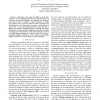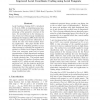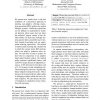986 search results - page 56 / 198 » Zero-data Learning of New Tasks |
JMLR
2010
14 years 4 months ago
2010
Much recent research has been devoted to learning algorithms for deep architectures such as Deep Belief Networks and stacks of auto-encoder variants, with impressive results obtai...
ICRA
2007
IEEE
15 years 4 months ago
2007
IEEE
— Ubiquitous robots need the ability to adapt their behaviour to the changing situations and demands they will encounter during their lifetimes. In particular, non-technical user...
MA
1999
Springer
15 years 2 months ago
1999
Springer
In order to maintain their performance in a dynamic environment, agents may be required to modify their learning behavior during run-time. If an agent utilizes a rule-based system...
ICML
2010
IEEE
14 years 11 months ago
2010
IEEE
Local Coordinate Coding (LCC), introduced in (Yu et al., 2009), is a high dimensional nonlinear learning method that explicitly takes advantage of the geometric structure of the d...
SIGDIAL
2010
14 years 7 months ago
2010
We present new results from a real-user evaluation of a data-driven approach to learning user-adaptive referring expression generation (REG) policies for spoken dialogue systems. ...



